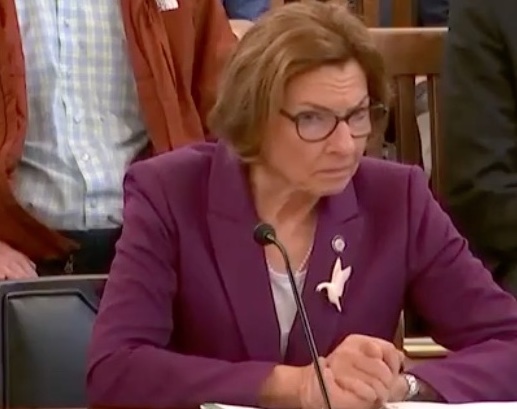By DON SMITH
Let’s investigate Sen. Cathy Giessel’s real motivations behind her advocacy of increased union benefits. But first, allow me to outline my credentials on the topic.
I was a mergers and acquisitions specialist regarding benefit plans at AT&T corporate headquarters and served as AT&T Alascom’s vice president of Human Resources. I was employed by the Alaska Railroad as a labor relations officer and served as the chief Human Resources officer at the University of Alaska (statewide). I know a lot about how defined benefits and defined contribution plans work. And frankly, her arguments for a new defined benefit plan are disingenuous.
How Sen. Giessel packages and sells this financial black hole to Alaskans needs more scrutiny. She asserts that the State of Alaska’s low employee retention and recruitment levels have reached crisis proportions because the state does not offer a defined benefit retirement plan. What data does she present to support this assertion?
Apparently, she has no comparative data with the private sector, for whom defined benefit (DB) plans began disappearing three decades ago?
My experience as an executive in the private sector in Alaska, and as an executive of public sector corporations, is that attraction and retention in both sectors are equivalent and in equilibrium. I disagree with the senator’s assertions that attraction and retention require higher levels of public benefits. Proof of this is readily available via a survey of public vs. private levels of compensation for the same or similar positions.
It is a fact that the remaining defined benefit plans are found solely in government employment and a few legacy private sector industries that have been unable to shed defined benefit plans. And those legacy DBs will also disappear when existing participants pass on because no new participants are allowed to enroll.
It is also a fact that in the private sector no new defined benefit plans have been implemented for over two decades. Perhaps those private sector fiduciaries know something about defined benefits that Sen. Giessel is ignoring? Is her focus really on levelling the employment playing field, or on tilting it in favor of unions?
Please spend a few moments reading about why defined benefits plans failed at Investopedia.
Sen. Giessel suggests that SB 88 employs best practices that are used in other state’s DBs. However, if these other state’s incorporate best practices, then why is it that every state retirement defined benefit in the country, except Minnesota’s, is essentially insolvent? For evidence of this, examine the fiscal insolvency of defined benefits in California, Pennsylvania, New Jersey, and Illinois. I wonder if Giessel is aware that politicians in those states have sought federal bailouts for their insolvent plans? Is that part of the best practices she believes Alaska should follow?
The defined benefits in those states are insolvent chiefly because those DBs are a mandatory subject of collective bargaining. Since they are a mandatory subject of collective bargaining, they are a prime target for union negotiators. It is no exaggeration to say that public sector defined benefits have become increasingly lavish to the point of insolvency, and their history is hidden from taxpayers. Politicians, it seems, prey on non-transparency, the bending of truth and “public interest finding” they are sworn to uphold.
Unless defined benefits are “off-the-table,” State negotiators are often too conciliatory and generous with these benefits because they are an invisible concession, “down the road” and they are unquantified.
The press focuses on wage increases, never on the obscure benefit plans. But as defined benefits increase, and the employee population of plan contributors decreases relative to the number of beneficiaries, the plans become insolvent. That is the reason why the private sector began to abandon them 30 years ago. That is why Alaska is already carrying such a huge unfunded liability, and the defined benefits in other states are insolvent.
Sen. Giessel’s representations that her proposed defined benefits will be confined to a relatively small sub-population of state employees is disingenuous. Once the plan is in place for a few employees, the labor unions for all other employees will demand the same defined benefit and the pandering legislators will have no basis to object.
Then we will have set the stage for the same disaster and fiscal mismanagement that doomed PERS I, II, and III. If it actually succeeds, it will come at the expense of the private sector and middle-class taxpayers.
I agree with Sen. Giessel that the current PERS IV is inadequate as a standalone retirement plan. The simple fix to that is to do what every private sector defined contribution plan has done and that is provide employer matching funds to employee contributions.
There are a variety of vesting schemes available to protect the employer and employee. The employer can adjust the contribution for the desired economic level. Typically, the employer match is in the range of 2% to 10% of the first 15% of an employee’s contribution. The advantage of the combined contribution plan with an employer match is that both parties have vested interest in the success of the plan.
In summary, Sen. Giessel believes her proposed defined will save money over the existing defined contribution plan (i.e., PERS IV). With respect, I find that assertion incredulous. If she is going to propose a plan of this potential fiscal impact to Alaska’s future, it’s incumbent on her to show Alaska’s future taxpayers the numbers. I’ve asked her to please reply with a worksheet that supports her assertion.
Don Smith is retired executive who specialized in human resources, labor relations, and mergers and acquisitions.
